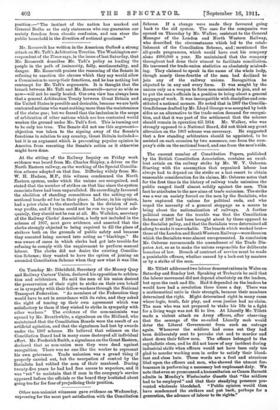Mr. Roosevelt has written in the American Outlook a strong
attack on Mr. Taft's Arbitration Treaties. The Washington cor- respondent of the Times says, in the issue of last Saturday, that Mr. Roosevelt describes Mr. Taft's policy as leading the people in the path of insincerity, folly, sentimentality, and danger. Mr. Roosevelt praises the reasoning of the Senate in refusing to sanction the clauses which they say would allow a Commission to usurp their functions, and he has nothing but contempt for Mr. Tait's arguments. It is thought that the breach between Mr. Taft and Mr. Roosevelt—never so wide as now—will not be easily healed. Our own view has always been that a general Arbitration Treaty between Great Britain and the United States is possible and desirable, because we are both contented nations who want nothing more than the maintenance of the status quo ; but we feared that the inclusion in the scope of arbitration of other nations which are less contented would weaken the ground under Mr. Taft's feet. This is turning out to be only too true. The Senate did not use this argument— objection was taken to the signing away of the Senate's functions in relation to any country, Great Britain included— but it is an argument which is preventing popular opinion in America from resenting the Senate's action as it otherwise might have done.










































 Previous page
Previous page